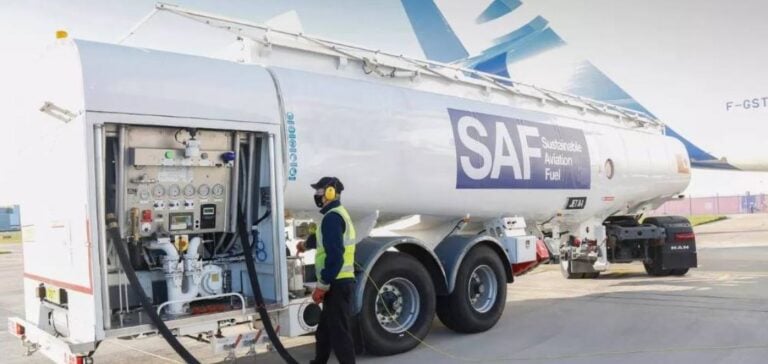The partnership between Abu Dhabi Future Energy Company PJSC – Masdar and TotalEnergies marks a significant step forward in the field of decarbonization.
The project focuses on the conversion of green hydrogen into methanol, and then into Sustainable Air Fuel (SAF).
The aim is to reduce emissions in sectors that are difficult to decarbonize, such as aviation and shipping.
The project uses CO2 captured from industrial sources as feedstock to produce green methanol and SAF, in addition to renewable hydrogen from electrolysis powered by renewable energies.
An Agreement Following a Successful Test Flight
The agreement between Masdar and TotalEnergies follows a successful test flight, carried out during COP28 in December 2023, which demonstrated the potential for converting methanol into SAF.
The test highlighted the efficiency of the process, reinforcing the credibility of the project. Masdar, which focuses on the development of green hydrogen, has established several strategic partnerships to support the growth of the SAF sector.
The company is committed to tackling environmental challenges while developing innovative solutions for sustainable aviation.
Emirates Policies and Objectives
The project is aligned with Abu Dhabi’s low-carbon hydrogen policy, which aims to promote low-carbon hydrogen as a future energy source.
This policy represents an important step towards economic sustainability, energy security and economic growth.
The United Arab Emirates (UAE) has set a voluntary target of using 1% locally-produced SAF in fuels supplied to national airlines by 2031, while developing a national regulatory framework for SAF.
Long-term vision and objectives
The initiative is part of the UAE’s National Hydrogen Strategy, which aims to position the country as a world leader in low-carbon hydrogen production by 2031.
Since its creation in 2006, Masdar has been a key player in the UAE’s vision of sustainability and climate action.
The company plans to increase its renewable energy production capacity to 100 GW by 2030, and to become a major producer of green hydrogen by the same year.






















